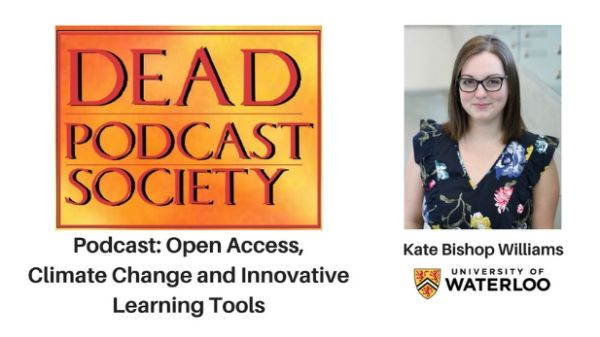Are You Using a Podcast in Your Classroom? You Should Be and Start with this Climate Change One!

Are You Using a Podcast in Your Classroom? You Should Be and Start with this Climate Change One!
By Doug Parsons
With contributions by Kate Bishop Williams
Are you using a podcast in your classroom? You should be! For some of you, this might be roll your eyes obvious, but there are actually quite a few folks out there who do not know what a podcast is (it’s not a blog!). And get this, only 17% of Americans (let alone the world), listen to podcasts on a weekly basis. But word is getting out, and the number of podcasts being produced and listened to is growing fast. Podcasts are not listened to by everyone, but they are really popular with younger people, so its potential value as a classroom tool should be obvious. Podcast are mainly ‘consumed’ on smart phones, which have become permanent pieces of younger people (well, me too).
I host a podcast called America Adapts - The Climate Change Podcast. Climate change is an emerging issue and the podcast offers a new, conversational way to dig into a very substantive topic. The expert guests (list of experts/topics here) explain the topic, and discuss how we’re going to adapt to climate change. Climate change has often been an impenetrable issue for many people. A podcast, if done correctly, offers a way to demystify the issue. I’ve had listeners tell me, when they listen to the podcast, it’s like they are there, in the room with me, having these conversations. This offers a rare opportunity to engage students with a complex and demanding topic.
Some of you are probably asking, what is climate adaptation? There are two sides to climate change: mitigation and adaptation. Mitigation is what we generally get in the news. It’s about how we mitigate our carbon emissions. The Paris Climate Accord is an attempt by most of the countries in the world to set carbon emissions targets to limit the total warming that will occur if we keep pumping carbon dioxide into the atmosphere. It’s ambitious work, and generally when you hear about climate change in the news, it’s related to carbon. But on the flip side, no matter what we do with carbon emissions (yes, we need to get this under control), there will be some continued warming. It’s baked in. Probably for hundreds of years. We’re just not sure how bad it will get. We’ll experience drought, sea level rise, human migrations, among other things. I didn't mean to depress you, and the podcast is actually very positive, but you do need to know what the stakes are. You will be happy to know that people doing climate change adaptation are working hard to demonstrate that society can adapt. That’s who I talk to on the podcast. It’s a chance to learn about the most important issue humanity will face in the coming decades, an issue that has barely gotten any attention. Let the podcast be your entry into this complex and sobering topic!
So you may be asking, why should you use this material in the classroom. Are the goals I pursue through the podcast relevant to your coursework? In a nutshell, my goals are as follows:
- Catalyze global scale connections to experts and information on climate adaptation practice and research.
- Enhance visibility of adaptation research and current solutions to impacts of climate change, thereby connecting professionals and their efforts to maximize the resource base and increase the speed by which we can prepare and respond.
- Communicate critical issues on an inviting platform through interviews with scientists, activists, policy makers and journalists to communicate with the public, emphasizing adaptation and climate change.
- Broadcast the challenges presented by adapting to climate change through a variety of media platforms.
- Inspire the public with the message of hope and possibilities balanced with an emphasis on the critical need to make changes.
As you can see, many of those goals are relevant to people involved with STEM learning and I hope the final one aligns with what educators are always trying to do. The conversations are not political, but they explore this emerging issue of climate adaptation that very few people have actually put much thought into. It’s a chance to learn about a monumentally important subject in a way that will resonate. Climate change and adaptation fit beautifully into the world of STEM. The podcast delivers on many of the goals associated with STEM learning. And it’s easily digestible STEM content!


There are many podcasts that are worthy of being used in an academic setting. But you need to find the appropriate one and also structure your curricula in an effective manner if your students are going to take advantage of this emerging resource. I encourage you to find other podcasts, in other subjects, that could be useful in your classroom. There are lots of great of science related podcasts, many of which would be justified using in the classroom.
As educators all know, it’s a challenge to get a student’s attention, even harder to maintain it. Using podcasts in the classroom offers an innovative and creative approach to learning that might be an option for you.
Do you have a question? Let us know, write your comments below! And if you have used a podcast in your classroom before, how did you do it?
Additional Resources:
The Atlantic: The Value of Using Podcasts in the Classroom
Science Direct: How can podcasts support engaging students in learning activities?
America Adapts on Facebook: https://www.facebook.com/americaadapts/
Twitter: @usaadapts, @kbishopwilliams
Instagram: https://www.instagram.com/america_adapts/
